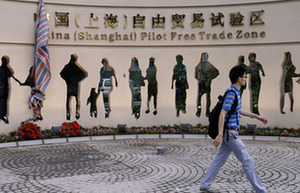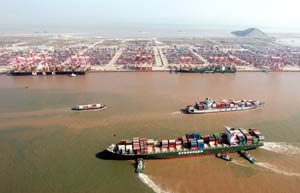SHANGHAI -- Financial reform is the most valuable item on the Shanghai pilot zone's reform agenda, and further opening is needed to correct market distortions, said a government adviser on Monday.
 |

|
According to Wang, the Shanghai free trade zone (FTZ), a 28.9-square-km area established a year ago, should continue to explore ways to open China's tightly controlled capital account and allow interest rates to better reflect market demand.
"Going forward, the FTZ should develop more products to allow offshore investors to invest using offshore renminbi," Wang said.
The FTZ has already expanded the cross-border use of the Chinese currency in trade payment, cash management and financing. The Shanghai Gold Exchange, the world's largest physical gold-trading platform, has also launched an international gold board allowing offshore investors to trade yuan-denominated contracts.
Jerry Zhang, Standard Chartered Bank's China CEO, said that the authorities' move to lift currency controls in the FTZ has enabled banks to help their clients manage cash flow more efficiently and reduce financing costs.
She added that renminbi financing costs on the Chinese mainland and in the offshore markets have tended to converge, as more financial instruments have become available for investors holding the Chinese yuan.
"The offshore yuan-denominated bond market is growing, authorities have approved more RQFII quotas for foreign investors, and banks are raising rates in the scramble for offshore yuan deposits. All these and other financial instruments have pushed up rates," the bank executive told Xinhua on the sidelines of the forum.
Shanghai's cross-border trade settlement using the renminbi stood at 826.8 billion yuan for the first six months of this year, up 169 percent from the second half of last year, while a quota totaling $283.3 billion has been approved for foreign institutions using offshore renminbi to invest in China's capital market, a report issued on Monday by the Shanghai Financial Association showed.
Following the official launch of the Shanghai pilot zone a year ago, several local governments have reportedly tendered their proposals to create similar zones, though few have gained explicit approval from the central government. Economists and government officials involved in designing the Shanghai pilot zone have repeatedly said the project is not another economic zone with preferential policies, but rather a place used to conduct "stress tests" for liberalization policies to see how they would impact the overall economy.
"Previous opening up measures were used to push up exports and investment for economic growth, whereas the current opening in the Shanghai pilot zone is to create incentives for reform," Wang said.
